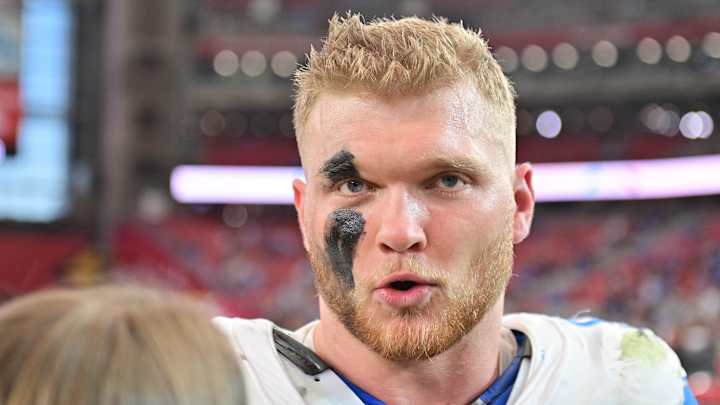The Detroit Lions established a standard by extending contracts for players they consider core members early, remaining proactive in adapting to the fluctuating market values at different positions.
Last offseason, the Lions provided extensions with a minimum of $20 million AAV to quarterback Jared Goff, wide receiver Amon-Ra St. Brown, and offensive tackles Penei Sewell and Taylor Decker. Now that the members of the 2022 draft class are eligible for extensions, players like Aidan Hutchinson and Kerby Joseph may be next.
The Lions might have to spend significantly on Hutchinson because of the importance assigned to the defensive end role. Before sustaining a leg injury that ended his season, he was on track to surpass the NFL’s single-season sack record and performed at a Defensive Player of the Year standard.
Consequently, he has established himself among the elite defenders in the NFL and is projected to profit accordingly. This offseason, other top edge rushers Maxx Crosby and Myles Garrett have secured new contracts. Garrett’s deal established new market standards with an AAV of $40 million annually.
At this point, the Lions’ management will probably need to offer a contract close to that amount. Although that sum appears substantial, Sports Illustrated’s Albert Breer noted that there are advantages to finalizing the extension now rather than postponing it.
Between the last year of his rookie contract and the fifth-year option that Detroit is expected to activate, Hutchinson has two more seasons of team control remaining. These two years can be transformed into a theoretical extension, potentially converting a four-year contract into a six-year contract with a reduced AAV.
That being said, there’s a trick to all of this if you complete Hutchinson now. He is owed $25.45 million over the next two years, which will be included in the new contract,” Breer stated. “Let’s assume he signs a four-year, $160 million extension with the Detroit Lions, extending his contract through the 2030 season.” In that scenario, the actual financial amount for the agreement would total $185.45 million across six years, averaging $30.9 million annually.
This approach resembles what the Lions implemented last year with offensive tackle Penei Sewell, who is currently under his fifth-year option as a first-round selection from 2021. Sewell inked a four-year extension that functions as a six-year contract, since he signed while having two years of team control left.
Detroit has showcased a distinctive contract framework with its recent agreements and extensions, starting with a lower base salary at the beginning of the deal and distributing the cap impact through void years. No matter how they tackle it, reaching a deal with Hutchinson this offseason would enable them to make the most of the time they have with the homegrown former No. 2 overall selection.
Consequently, the Lions might gain significantly by reaching an agreement with Hutchinson prior to the offseason’s conclusion.
